“No more let us falter! From Malta to Yalta!” telegraphed Prime Minister Winston Churchill to President Roosevelt on New Year’s Day, 1945. The Yalta Conference, set for February 4 through 11, was going to decide the fate of Postwar Europe.
But first, the British and American delegations were meeting at Montgomery House on the Mediterranean Island of Malta January 30 through February 3 before flying in to Yalta, as shown in this newsreel video: Churchill, Stalin, and Roosevelt meet in Yalta.
Meeting in Malta from the United States: Secretary of State Edward Stettinius, Ambassador Averell Harriman, Gen. George Marshall, Adm. Ernest King, Adm.William Leahy, and Gen. Laurence Kuter (representing Gen. H.H. Arnold). President Roosevelt did not arrive until the final day and so didn’t participate substantially in this preconference.
And from Great Britain: Prime Minister Winston Churchill, Foreign Secretary Anthony Eden, Field Marshal Maitland Wilson, Field Marshal Sir Alan Brooke, Air Chief Marshal Sir Charles Portal, Admiral of the Fleet Sir A.B. Cunningham, and General Sir Hastings Ismay.
The group wanted to decide how to conduct the final campaign against Germany, and how to keep the Soviet Union out of Central Europe.
The meetings in Malta did not go well.
As George Marshall remembered for his biographer years later:
“At Malta we had a very acid meeting,” Marshall recalled. “[Brooke] said the British chiefs of staff were very much worried by the influence on General Eisenhower of General Bradley, and I think he mentioned General Patton. And I said, ‘Well, Brooke, they are not nearly as much worried as the American chiefs of staff are worried about the immediate pressures and influence of Mr. Churchill on General Eisenhower. The president practically never sees Eisenhower, never writes to him—that is at my advice because he is an Allied commander—and we are deeply concerned by the pressures of the prime minister and the fact of the proximity of the British chiefs of staff, so I think your worries are on the wrong foot.’ We had a terrible meeting.”
Before leaving for Yalta, the leadership of the American delegation held their own meetings on a ship anchored in the harbor at Malta.
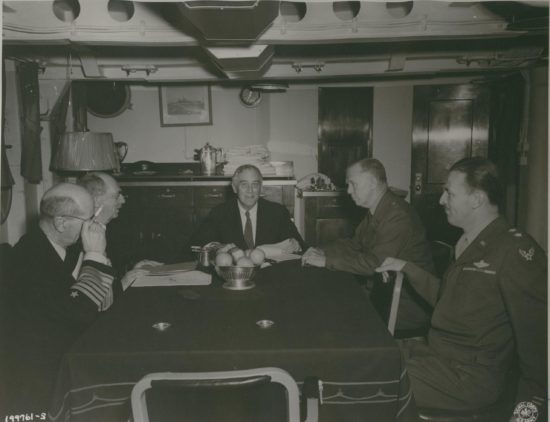
Meeting on the boat at Malta: Adm. King, Adm. Leahy, President Roosevelt, Gen. Marshall, and Gen. Kuter.
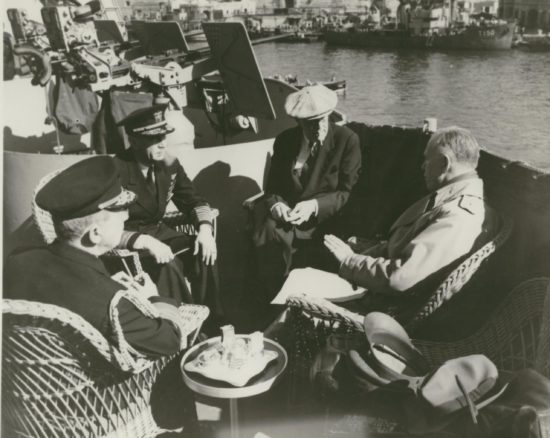
Meeting topside: Adm. Leahy, Adm. King, President Roosevelt, and Gen. Marshall
At these American meetings, Secretary Stettinius listed seven things that President Roosevelt needed to discuss with Prime Minister Churchill and Premier Stalin at the Yalta Conference:
(1) creation of a postwar international organization
(2) creation of an emergency European high commission to serve during the interim between the end of war and the permanent organization
(3) political and economic treatment of Germany
(4) Poland
(5) Allied control commissions in Rumania (sic), Bulgaria, and Hungary
(6) Iranian relations
(7) China
On arriving by plane at Saki Airfield in the Crimea, some miles from Yalta, the American delegation was treated to a full Russian breakfast banquet held in large tents. Gen. Marshall maintained his composure when what he thought was a glass of fruit juice turned out to be Russian brandy!
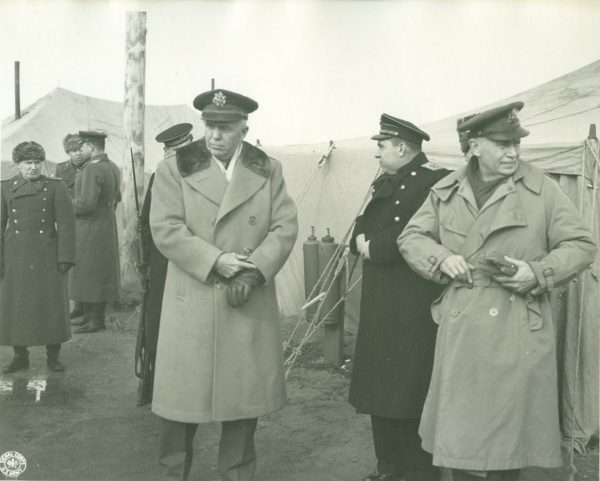
Gen. Marshall at Saki Airfield with breakfast tents in the background.
During the conference, the American delegation of nearly 200 stayed in the czarist summer palace Livadia in Yalta, right on the Black Sea. The palace was built and lavishly furnished in the 1860s for the czar and his family. It had been looted by the German Army who had occupied the palace during the Crimean campaign, so only furnishings necessary for the conference were there.
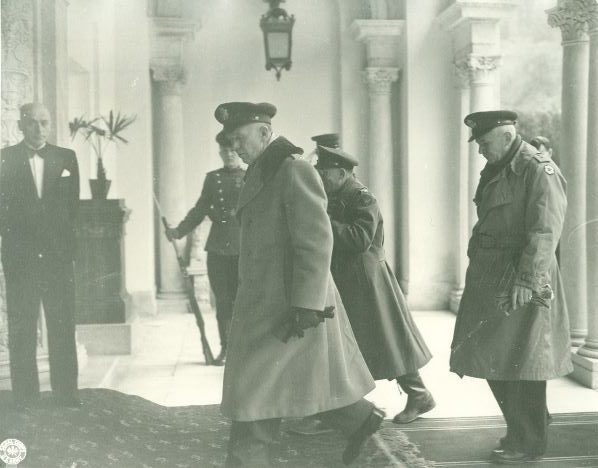
Gen. Marshall arriving at Livadia Palace.
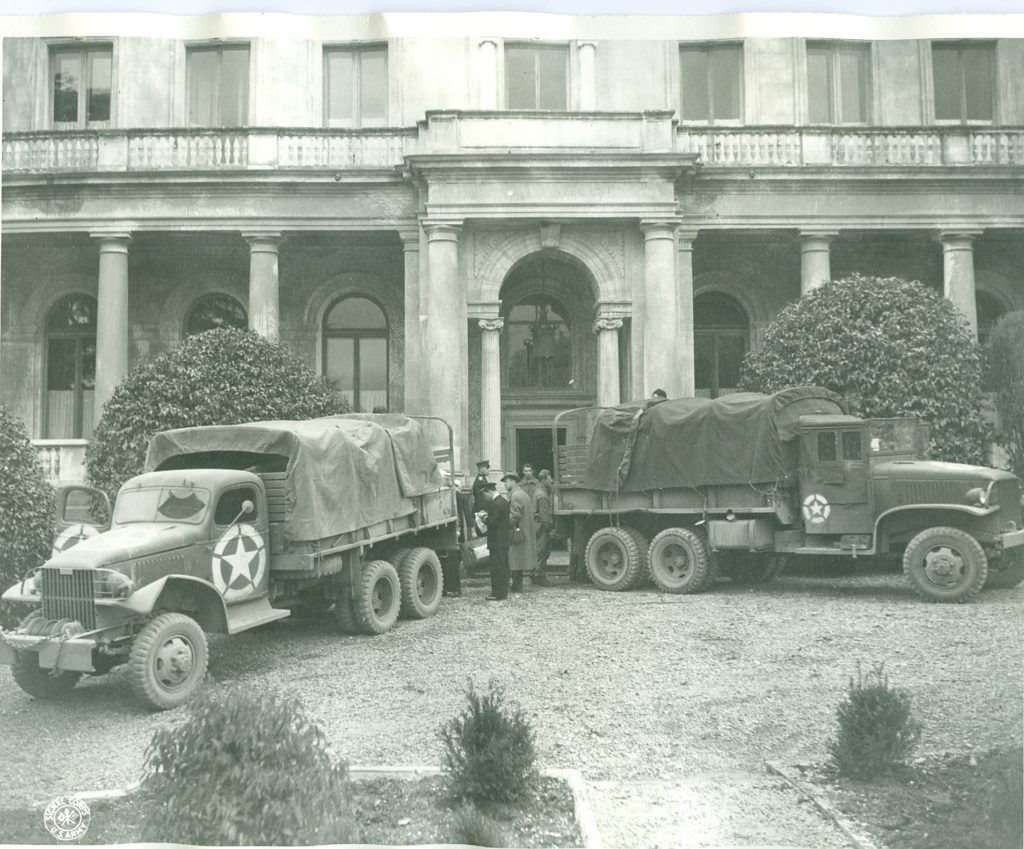
The luggage of the American delegation being offloaded at Livadia Palace.
The senior members of the delegation had spacious royal apartments and rooms. Junior members had to share space, with 11 colonels sharing one bedroom. For all its palatial appointments – ballroom, gardens, its own chapel – Livadia was woefully short bathrooms! It is said that except for the ongoing war, the bathroom situation was the most discussed subject at the conference.
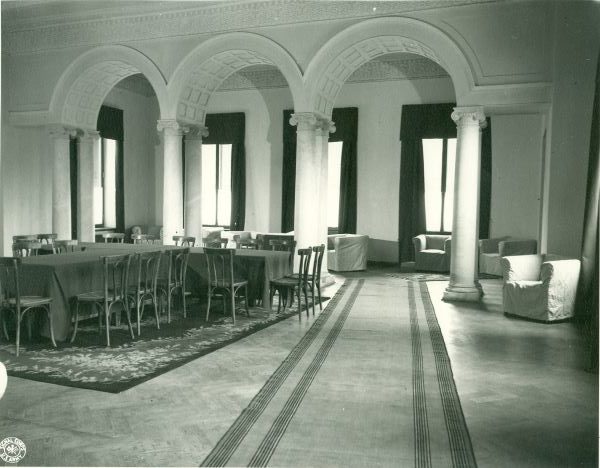
Conference room set up at Livadia Palace.
Livadia Palace is also where the conference meetings were held, as President Roosevelt was designated the host of this conference even though it was being held on the Crimean Peninsula.
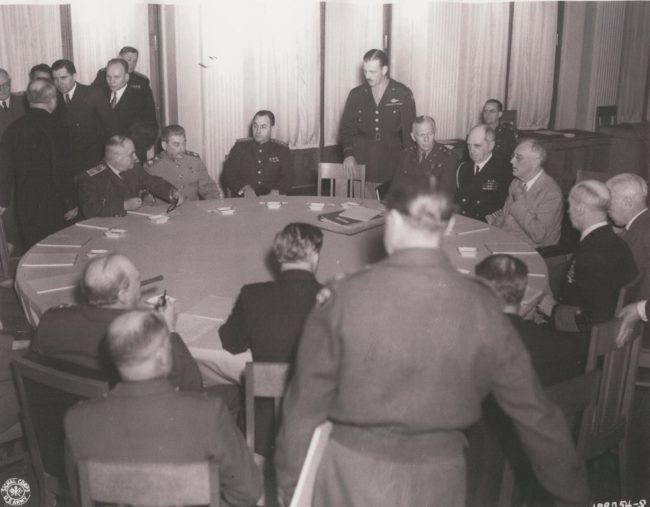
Prime Minister Churchill, Premier Stalin, Gen. Kuter, Gen. Marshall, Adm. Leahy, President Roosevelt, and Adm. King with others at a meeting.
Gen. Marshall attended the first session at Yalta and summarized the military situation in Europe. He was also at last session. At the other sessions attended by the leaders of the three countries, Adm. Leahy, as head of the Joint Chiefs of Staff, represented the U.S. military. Decisions made in these meetings largely did not involve Gen. Marshall; he attended other meetings with military staff from Great Britain and the Soviet Union.
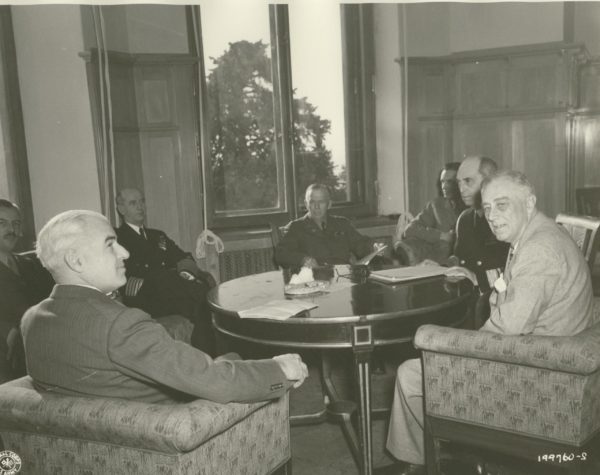
Secretary Stettinius, Gen. Kuter, Adm. King, Gen. Marshall, Adm. Leahy, and President Roosevelt meeting around a table at Livadia Palace.
President Roosevelt was ill and in poor health at Yalta. He brought his daughter, Anna Roosevelt Boettiger, who cared for administrative details, with him. She knew how gravely ill her father was, but the President’s doctor hadn’t informed him yet.
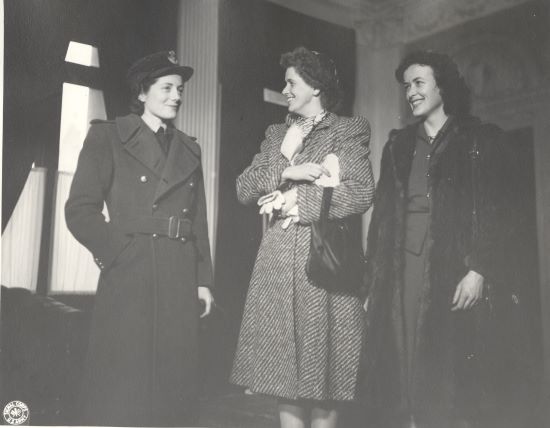
Sarah Churchill, Anna Boettiger, and Kathleen Harriman at Yalta.
Anna was not the only daughter there — Prime Minister Churchill also brought his daughter, Sarah, a member of the Women’s Auxiliary Air Force; and Averell Harriman brought his daughter, Kathleen, a journalist who spoke Russian.
The final agreements at the conference at first pleased the American delegation as they thought the U.S.-Soviet relationship would last after the war ended. When it didn’t, President Roosevelt’s choices at Yalta resulted in detractors accusing the President of giving up Eastern Europe and Northeast Asia to the Soviets.
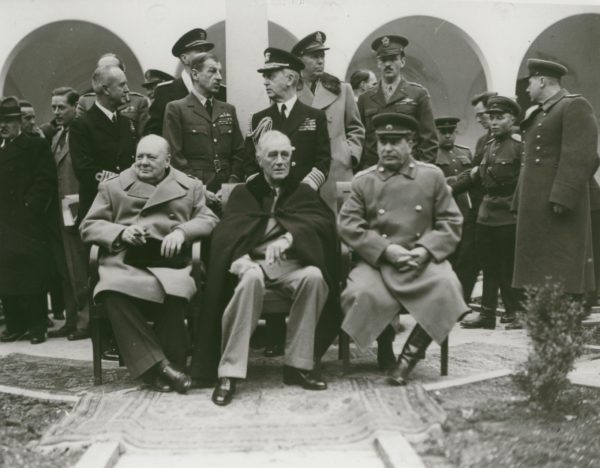
Photograph of meeting participants in the courtyard at Livadia Palace.
This was the last conference for these three wartime leaders. At the Potsdam Conference in July 1945, President Harry Truman and (part-way through the conference) Prime Minister Clement Atlee met with Premier Stalin.
George Marshall quote from Organizer of Victory, volume 3 of George Marshall’s biography by Dr. Forrest Pogue.
Photos from the George C. Marshall Foundation.
Melissa has been at GCMF since last fall, and previously was an academic librarian specializing in history. She and her husband, John, have three grown children, and live in Rockbridge County with three large rescue dogs. Keep up with her @life_melissas.
